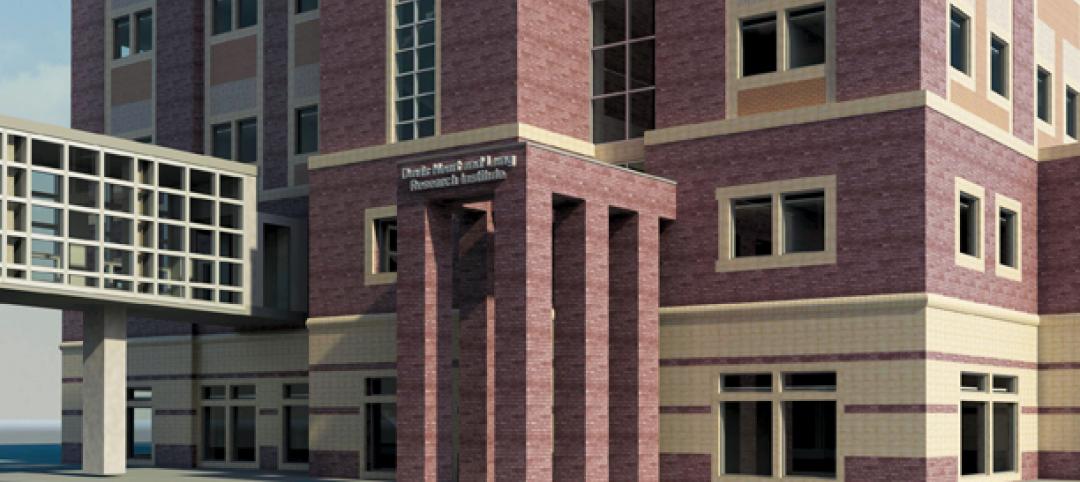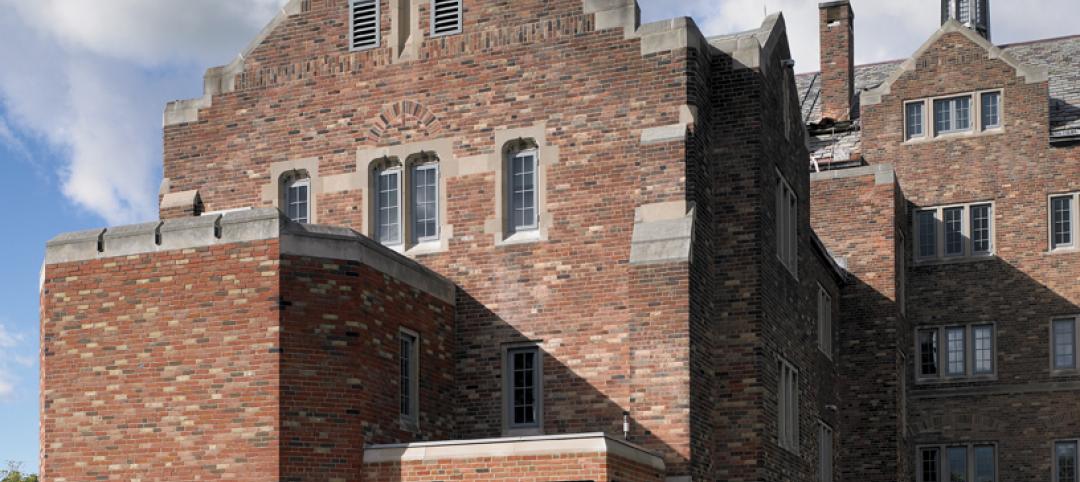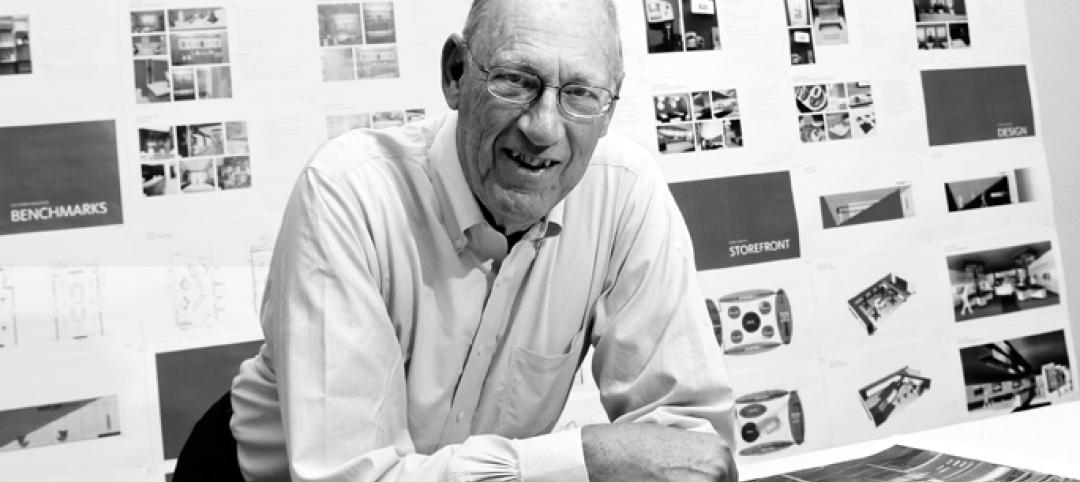Destination Food, an open-source technology platform that connects food supply with demand on a local level, was voted the $3,000 Grand Prize winner in Building Design+Construction's first annual Vision U40 Competition. The competition took place last week at BD+C's Under 40 Leadership Summit in San Francisco.
The goal of the competition was to develop and present innovative solutions for today's pressing social, economic, technical, and cultural problems related to the built environment. Fifteen teams participated in the Vision U40 competition. Each team had just 90 seconds to pitch their concept to the entire group, who voted for their top five.
Here are the five winning teams (click here to see all 15 concepts):
1. Destination Food ($3,000 grand prize winner)
Problem: More than 23 million Americans live without access to affordable, nutritious food. Making things worse, 40% of the food in the U.S. goes to waste.
Solution: Destination Food is an open-source technology platform that connects food supply with demand in a simple, convenient, and affordable way. The app includes a database of profiles and ratings for growers, GPS mapping for connecting consumers to the closest food suppliers, and a scheduling tool for setting up deliveries.
Team:
Cynthia Dubberley, Architect, Eskew + Dumez + Ripple, New Orleans
Christina Weber, Business & Community Development, DIRTT Environmental Solutions, San Francisco
Tyler Krehlik, Architect, SmithGroupJJR, San Francisco
Kelly Dubisar, Architect, Gensler, San Francisco
2. The Kids Are Alright ($500)
Problem: The younger generation prefers to stay inside, whether in the classroom or on the couch. Additionally, parents are missing out on sharing the same learning opportunities their children have.
Solution: Create a Foursquare-type mobile app that, instead of pulling up nearby restaurants, provides educational information based on your current location—from details on the oak tree in your backyard to the history of the landmark building in the center of town. The app encourages kids and their parents to interact with and learn about their surrounding environment.
Team:
Beatrice Tang, Associate Principal, Callison, Seattle
David Monroe, Assistant Project Manager, Balfour Beatty, Dallas
Lauren Smith, BIM Manager, S.M. Wilson & Co., St. Louis, Mo.
3. F.A.B.R.I.C. ($500)
Problem: "Unsocial" media has unraveled the fabric of our neighborhoods. How do we encourage people to get outside and interact and connect with their neighbors and communities?
Solution: This digitized sidewalk encourages people to get outside and weave back into their communities. F.A.B.R.I.C. (short for "future, active, bio-optic, responsive, inter-community" sidewalk) features virtual, interactive games, energy generation, social spaces, and an associated mobile app that, for instance, will alert users when a friend is nearby.
Team:
Elliott Disney, Project Engineer, Southland Industries, Union City, Calif.
Greg Hadsell, Associate, HDR Architecture, San Francisco
Susie Westrup, Sustainability Specialist, Balfour Beatty, Dallas
Nathan Ducote, Project Manager, Balfour Beatty, Dallas
4. WellBOX ($500 - tied for fourth place)
Problem: During the next 20 years, 970 million people will be added to third-world countries. These areas lack access to critical healthcare services and clean water.
Solution: The WellBOX is a portable health clinic that can be dropped into any region of the world to provide clean drinking water and healthcare services and education. The self-sustaining unit will be powered by solar panels and will tap into a local well to provide water filtration. The modular structure will come equipped with tele-medicine equipment, allowing doctors to diagnos remotely.
Team:
Emily Guglielmo, Senior Structural Engineer, Martin/Martin, Larkspur, Calif.
Candace Small, Architect, VOA Associates, Chicago
Vincent D'Ambrosio, Senior Vice President, Hill International, Marlton, N.J.
Chris Hermreck, Project Manager, JE Dunn Construction, Kansas City, Mo.
4. Internext ($500 - tied for fourth place)
Problem: The digital information world offers us instantaneous, universal access, but inundates us with data in a constant, overwhelming stream. As a result, our connections to others and our surrounding community are becoming less meaningful. We've lost our sense of place.
Solution: Internext filters when and where you receive specific digital information based on rules you set, helping you prioritize your life following preferences that reflect your values. Want to spend more time with your family? Set a rule that holds all email after 6 p.m. on workdays. Want to connect with fans of your favorite team while on vacation? Let Internext find the popular hangouts.
Team:
Dace Campbell, Customer Success Manager, Autodesk, Shoreline, Wash.
David Mayman, Architect, Gensler, San Francisco
Craig Chinn, Associate Principal, KTGY Group, Irvine, Calif.
Molly Engelbert, Assistant Project Manager, Balfour Beatty, Dallas
Related Stories
| Jan 3, 2012
Callison acquires Barteluce Architects & Associates
This acquisition will grow Callison’s New York team to over 75 architects.
| Jan 3, 2012
VDK Architects merges with Harley Ellis Devereaux
Harley Ellis Devereaux will relocate the employees in its current Berkeley, Calif., office to the new Oakland office location effective January 3, 2012.
| Jan 3, 2012
Weingarten, Callan appointed to BD+C Editorial Board
Building Design+Construction has named two new members to its editorial board. Both are past recipients of BD+C’s “40 Under 40” honor.
| Jan 3, 2012
New Chicago hospital prepared for pandemic, CBR terror threat
At a cost of $654 million, the 14-story, 830,000-sf medical center, designed by a Perkins+Will team led by design principal Ralph Johnson, FAIA, LEED AP, is distinguished in its ability to handle disasters.
| Jan 3, 2012
BIM: not just for new buildings
Ohio State University Medical Center is converting 55 Medical Center buildings from AutoCAD to BIM to improve quality and speed of decision making related to facility use, renovations, maintenance, and more.
| Jan 3, 2012
New SJI Rule on Steel Joists
A new rule from the Steel Joist Institute clarifies when local reinforcement of joists is required for chord loads away from panel points. SJI members offer guidance about how and when to specify loads.
| Jan 3, 2012
AIA Course: New Developments in Concrete Construction
Earn 1.0 AIA/CES learning units by studying this article and successfully completing the online exam.
| Jan 3, 2012
The Value of Historic Paint Investigations
An expert conservator provides a three-step approach to determining a historic building’s “period of significance”—and how to restore its painted surfaces to the correct patterns and colors.
| Jan 3, 2012
28th Annual Reconstruction Awards: Bringing Hope to Cancer Patients
A gothic-style structure is reconstructed into comfortable, modern patient residence facility for the American Cancer Society.
| Jan 3, 2012
Art Gensler: Still Making a Difference for Clients Every Day
After running what is today the largest architecture firm in the world for more than four decades, M. Arthur Gensler, Jr., FAIA, FIIDA, RIBA, is content to be just another employee at the firm that bears his name.















